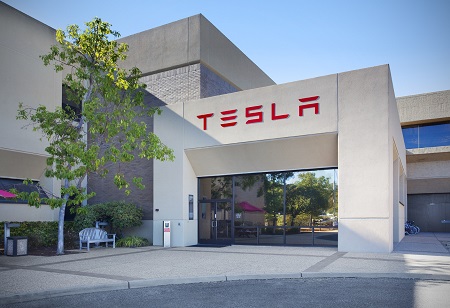
Tesla Increases China investment With Plans For Shanghai Battery Factory

 At a time when tensions between Beijing and Washington are growing, Tesla Inc. will expand its investment in China by constructing a new battery factory in Shanghai.
At a time when tensions between Beijing and Washington are growing, Tesla Inc. will expand its investment in China by constructing a new battery factory in Shanghai.
The new factory will house Tesla's Megapack large-scale energy-storage unit and is an addition to its Shanghai electric vehicle production. At a signing ceremony for the project in Shanghai, the business led by Elon Musk, who is rumoured to be visiting China this weekend, made the announcement. Tesla Vice President Tao Lin signed the agreement in the presence of Shanghai government representatives, including vice mayor Wu Qing and Tesla Senior Vice President of Automotive Tom Zhu.
According to a statement from the corporation, construction will start in the third quarter of this year, and the factory will start producing in the second quarter of 2024.
Shortly after France's Airbus SE revealed plans to expand its production capacity in the nation for one of its best-selling jets, Tesla announced plans to increase its investment in China. According to an agreement signed by Chief Executive Officer Guillaume Faury in Beijing, the European aircraft manufacturer would add a second final assembly line for A320 narrow-bodies at its current production in Tianjin.
The new manufacturing initiatives support Chinese industry as other companies, such as Apple Inc., reconsider their production in the country amid heightened tensions with the US over a variety of issues, including Beijing's alliance with Russian President Vladimir Putin and an alleged Chinese spy balloon shot down over American skies.
The business claims that each Megapack unit can store enough energy to power an average of 3,600 homes for one hour. The Megapack is designed as a huge battery to aid in the stabilisation of energy grids. The new facility will first crank out 10,000 Megapacks annually, or around 40 GWh of energy storage, and sell the goods all over the world.
China, where BYD Co., a growing global electric vehicle star, is based, is a crucial market for Tesla. Even with production being hampered by China's now-abandoned Covid Zero policy, its current auto factory on the outskirts of Shanghai, which the US company owns completely, produced about 711,000 cars last year, or 52% of its worldwide output.
Early in 2019, authorities put out the red carpet to help Tesla establish its first facility outside of the US, and Shanghai government representatives helped the business resume production quickly after pandemic-related delays.
Yet, Musk's time working in China hasn't always been easy. People with knowledge of the situation claimed earlier this year, days after irate Tesla owners flocked to showrooms in China to gripe about missing out on yet another round of price reductions, that an expansion of the Shanghai EV plant was delayed due to data concerns about Tesla's connections to Musk's internet-from-space initiative Starlink.
Early in 2021, Tesla automobiles were also prohibited from Chinese housing compounds and military installations due to worries that the cars' cameras would be used to acquire private information.
Musk said on an earnings call in January that China is the most competitive auto market. He’s made similar comments before, including during an online forum in September 2021, when he said he had “a great deal of respect for the many Chinese automakers."

